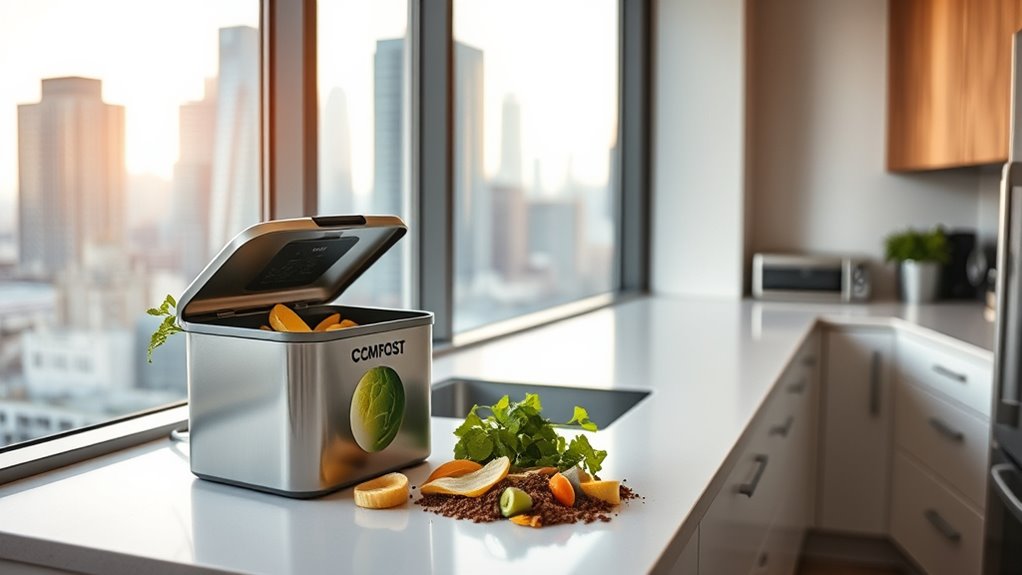To compost in your apartment, choose a small, odor-controlled bin with ventilation and drainage. Layer kitchen scraps like fruit peels, coffee grounds, and crushed eggshells with shredded paper or cardboard to manage moisture and airflow. Turn the compost regularly and keep it moist but not soggy. Avoid adding meat or dairy to prevent pests and odors. If you stick with it, you’ll discover simple steps to turn waste into rich soil, and there’s more to learn for success.
Key Takeaways
- Choose a small, odor-controlled container with ventilation and drainage for indoor composting.
- Layer kitchen scraps with dry materials like shredded paper to maintain balance and control odors.
- Turn and mix compost regularly, keeping it moist like a damp sponge for efficient decomposition.
- Keep the bin in a shaded, cool spot away from direct sunlight to prevent smells and pests.
- Avoid adding meat, dairy, oily foods, or pet waste to prevent pests and foul odors in urban environments.

Have you ever wondered how to reduce waste and enrich your apartment’s soil without a yard? Urban composting is the answer, and it’s easier than you might think. You don’t need a backyard or a garden—just a bit of space and the right setup. The key is a proper container setup that works for your apartment environment. You’ll want to choose a container that fits comfortably on your balcony, windowsill, or even inside your kitchen. Look for one with a lid and good ventilation to keep odors at bay and pests out. Many urban composters prefer bin systems with small holes or vents to promote airflow, which is essential for breaking down organic waste efficiently.
Start by selecting a container made from durable, non-toxic materials; plastic, ceramic, or metal bins work well. Make sure it has drainage holes or a tray underneath to catch excess liquid. This liquid, known as compost tea, can be beneficial as a natural fertilizer for your houseplants, so don’t discard it. When setting up your container, place a layer of coarse material like small twigs or shredded paper at the bottom to help with aeration. Then, add your compostable scraps—fruit and vegetable peels, coffee grounds, eggshells, tea bags, and even paper products. Remember, avoid meat, dairy, oily foods, and pet waste, as they can attract pests or cause odors.
Choose a durable, non-toxic container with drainage, add coarse material, and include only compost-friendly scraps.
Urban composting in a container isn’t just about dumping waste in and hoping for the best. It requires some maintenance. Every few days, turn or mix the contents to aerate the pile, which speeds up decomposition and prevents foul smells. Keep the moisture level similar to a damp sponge—if it’s too wet, add dry materials like shredded paper or cardboard; if it’s too dry, sprinkle a little water. Monitoring the balance of ‘greens’ (fruit and vegetable scraps) and ‘browns’ (paper, cardboard, dry leaves) is essential for a healthy compost.
You’ll also want to place your container in a spot that’s not exposed to direct sunlight or extreme temperatures, as this can affect the composting process. Many urban dwellers keep their compost bins indoors or on shaded balconies. Additionally, understanding the 16PF personality traits of successful urban composters can help you stay consistent with your routine. With a little patience and regular maintenance, you’ll soon have rich compost ready to boost your houseplants or balcony garden. Urban composting isn’t just eco-friendly; it’s a satisfying way to turn kitchen waste into something valuable. So, set up your container properly, stay consistent, and enjoy the benefits of composting right in your apartment.
Frequently Asked Questions
Can I Compost Meat and Dairy in an Apartment Setting?
You can compost meat and dairy, but it’s tricky in an apartment setting. Meat composting and dairy waste management often attract pests and create odors, making them less ideal for small spaces. If you want to include these, consider a sealed, odor-proof bin or a Bokashi system. These methods ferment the waste quickly and reduce smells, helping you manage meat and dairy scraps responsibly without attracting critters in your apartment.
How Often Should I Turn My Indoor Compost?
It might surprise you, but turning your indoor compost regularly is key to successful worm bin maintenance. You should aim to turn it every few days, ensuring even airflow and preventing odors. During this process, monitor the compost temperature to keep it between 55-77°F, which keeps the worms happy. Consistent turning distributes moisture and nutrients, helping your compost break down faster and stay healthy.
What Are the Best Odor Control Methods for Apartment Compost Bins?
To control odors in your apartment compost bin, consider air freshener options like charcoal filters or baking soda to absorb smells. Place your bin in a well-ventilated area away from living spaces, and use bin placement tips such as keeping it away from heat sources and ensuring it’s covered. Regularly turning and layering compost also helps minimize odors, keeping your indoor compost fresh and odor-free.
Is It Safe to Keep Compost Near My Living Area?
Worried about pests and poor air quality? Proper placement protects your space while promoting pest prevention and fresh air. Keep your compost bin in a well-ventilated, discreet corner away from walls and windows. Regularly monitor and maintain it to prevent odors and pests, ensuring your living area stays clean and safe. With cautious container placement, you can confidently keep compost nearby without compromising comfort or cleanliness.
How Long Does It Take for Compost to Be Ready Indoors?
The indoor compost timeline varies depending on factors like composting speed, materials, and temperature. Typically, it takes about 2 to 4 months for compost to be ready indoors. You can speed up the process by maintaining proper moisture, aeration, and balancing greens and browns. Keep an eye on the compost; when it looks dark, crumbly, and earthy, it’s ready to use. Patience and consistent care are key!
Conclusion
You might think composting in an apartment is too small-scale to make a difference, but even tiny efforts matter. Studies show that turning food scraps into compost reduces greenhouse gases and cuts down on waste in landfills. So, don’t underestimate your impact—by composting, you’re helping the environment one peel at a time. Your small act can inspire others and contribute to a greener city. Every bit counts, so keep composting and spreading the eco-friendly message!









